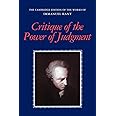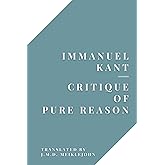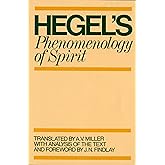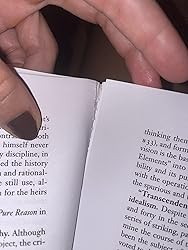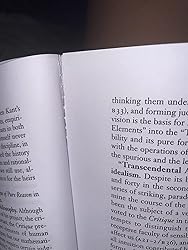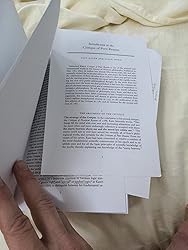
Enjoy fast, free delivery, exclusive deals, and award-winning movies & TV shows with Prime
Try Prime
and start saving today with fast, free delivery
Amazon Prime includes:
Fast, FREE Delivery is available to Prime members. To join, select "Try Amazon Prime and start saving today with Fast, FREE Delivery" below the Add to Cart button.
Amazon Prime members enjoy:- Cardmembers earn 5% Back at Amazon.com with a Prime Credit Card.
- Unlimited Free Two-Day Delivery
- Streaming of thousands of movies and TV shows with limited ads on Prime Video.
- A Kindle book to borrow for free each month - with no due dates
- Listen to over 2 million songs and hundreds of playlists
- Unlimited photo storage with anywhere access
Important: Your credit card will NOT be charged when you start your free trial or if you cancel during the trial period. If you're happy with Amazon Prime, do nothing. At the end of the free trial, your membership will automatically upgrade to a monthly membership.
Buy new:
-26% $39.39$39.39
Ships from: Amazon.com Sold by: Amazon.com
Save with Used - Good
$33.69$33.69
Ships from: Amazon Sold by: Martistore

Download the free Kindle app and start reading Kindle books instantly on your smartphone, tablet, or computer - no Kindle device required.
Read instantly on your browser with Kindle for Web.
Using your mobile phone camera - scan the code below and download the Kindle app.

OK
 Audible sample Sample
Audible sample Sample 


Critique of Pure Reason (The Cambridge Edition of the Works of Immanuel Kant)
Purchase options and add-ons
- ISBN-100521657296
- ISBN-13978-0521657297
- PublisherCambridge University Press
- Publication dateFebruary 28, 1999
- LanguageEnglish
- Dimensions6 x 1.81 x 9 inches
- Print length785 pages
Frequently bought together

Similar items that may deliver to you quickly
Editorial Reviews
Review
Book Description
Product details
- Publisher : Cambridge University Press (February 28, 1999)
- Language : English
- Paperback : 785 pages
- ISBN-10 : 0521657296
- ISBN-13 : 978-0521657297
- Lexile measure : 1500L
- Item Weight : 2.32 pounds
- Dimensions : 6 x 1.81 x 9 inches
- Best Sellers Rank: #67,258 in Books (See Top 100 in Books)
- #19 in Epistemology Philosophy
- #66 in Modern Western Philosophy
- #78 in Philosophy Metaphysics
- Customer Reviews:
About the author

Immanuel Kant (1724-1804) was one of the most influential philosophers of all time. His comprehensive and profound thinking on aesthetics, ethics, and knowledge has had an immense impact on all subsequent philosophy.
Photo by unknown (/History/Carnegie/kant/portrait.html) [Public domain], via Wikimedia Commons.
Customer reviews
Customer Reviews, including Product Star Ratings help customers to learn more about the product and decide whether it is the right product for them.
To calculate the overall star rating and percentage breakdown by star, we don’t use a simple average. Instead, our system considers things like how recent a review is and if the reviewer bought the item on Amazon. It also analyzed reviews to verify trustworthiness.
Learn more how customers reviews work on AmazonReviews with images
-
Top reviews
Top reviews from the United States
There was a problem filtering reviews right now. Please try again later.
So Kant is an extremely important philosopher. In my opinion Kant is the most important philosopher since Plato. Unfortunately the Critique of Pure Reason is also where philosophy started to become esoteric and inaccessible to the lay person. Of course it would be impossible for someone with no formal training in philosophy to pick up a metaphysical tract by John Duns Scotus and understand it. Philosophy has always been difficult. But I think Kant's Critique of Pure Reason introduced a qualitative change into philosophy. While John Duns Scotus may not be immediately accessible to the lay person it was still possible to become acquainted with the problems he was dealing with (the existence of God, the problem of universals, etc.) without necessarily being a professional philosopher. In other words, philosophical debates were not insulated from the debates taking place in non-professional circles, they were often the same debates just carried on at a higher more technical level. With Kant philosophy really becomes an insulated and esoteric discipline where philosophers are debating with themselves, and they are debating issues that non-philosophers do not even consider issues (whether and how categories can be derived from the table of judgments, the transcendental unity of apperception, the transcendental ideality of space and time, etc.). Obviously this is not a hard and fast distinction but I think there is some truth to what I am saying.
For those non-philosophers who want to read the Critique of Pure Reason and want some guidebooks to help them make sense of the book I do have some books to recommend but my short answer would be: unfortunately there is probably going to be a limit to how much you can do with the Critique of Pure Reason if you do not have formal training in philosophy. It is like a book in quantum mechanics. There are popular books that can give lay people some sense of quantum mechanics but if you really want to understand quantum mechanics you have to engage in the difficult task of learning the math and the science behind it, which is something few people are capable of doing on their own. The same is true of Kant. You can find popular books on Kant that give you some sense of what he was up to, but if you really want to understand Kant's philosophy you have to commit years to really working at it, and few people are probably capable of achieving it on their own.
The first two books on Kant I would recommend to the beginner are not books I have actually read but were recommended to me by my Kant professor as books that are good for absolute beginners with Kant and the Critique of Pure Reason. The first is A Short Commentary on Kant's Critique of Pure Reason by A.C. Ewing and the second is Kant's Critique of Pure Reason a Commentary for Students by T.E. Wilkerson. The first is supposed to be more accessible than the second.
There is also a routledge philosophy guidebook to the Critique of Pure Reason Routledge Philosophy GuideBook to Kant and the Critique of Pure Reason (Routledge Philosophy GuideBooks) by Sebastian Gardner (it will not let me link directly to the paperback edition but there is a cheaper paperback available). Personally I found Gardner's commentary to be quite accessible but I have also spent a fair amount of time studying Kant. Some of the other reviewers on amazon complain that it is not accessible to the beginner so if you find that to be the case I would recommend starting with one of the other two I listed above.
Finally, there are three books that are extremely important in Kant scholarship for those who want to have a deeper understanding of the Critique of Pure Reason. I actually have not read all of any of them (I have read parts of two of them) but I know that they are definitely not for beginners. They are, however, very important for those who are serious about the Critique of Pure Reason. The First is Kant's Transcendental Idealism: An Interpretation and Defense by Henry Allison. The second is Kant and the Claims of Knowledge by Paul Guyer (Allison and Guyer offer different, and conflicting, interpretations and there has been a long-standing debate between them about the correct way to interpret the Critique of Pure Reason). The last book that I think is really excellent is Kant and the Capacity to Judge: Sensibility and Discursivity in the Transcendental Analytic of the "Critique of Pure Reason" by Beatrice Longuenesse (I am currently working on a project using this book so I will probably be writing a review in a few months when I have finished).
I also want to say a word about the translation. I do not read German but I have a few comments to make. First, there is no such thing as a perfect translation. No matter what you do as a translator you are going to have some people complaining. Anyone demanding a perfect translation, or looking for one, is looking for something that does not exist. If you want to become a Kant scholar you have to learn German. Unfortunately Kant is so important as a philosopher that it is necessary for all philosophers, whether they specialize in Kant or German philosophy or not, to have some understanding of Kant, so translations become necessary. I would not put too much stock in the negative reviews of this translation. This is not a perfect translation, you should know that going in, but I think it is probably as good as any, and there are two reasons I recommend reading this one.
First, there are really two "standard" translations of the Critique of Pure Reason. The first is by Norman Kemp Smith and the second is this one by Guyer and Wood. My Kant professor has told me that the Norman Kemp Smith translation, while it was the standard for many years (and it was the first one I read), is very problematic. Specifically, Smith often corrects Kant's text to accord with his own interpretation of Kant. If you are not a serious Kant student that might not make much of a difference since you are probably not going to be delving into the subtleties of Kant's philosophy and Smith's translation should give you an accurate general picture of Kant's philosophy. But if you do plan on delving into the subtleties of Kant's philosophy it would be better to get a translation that has not been doctored to fit a particular interpretation.
Second, this is, whether you like it or not, going to be the standard translation of Kant for awhile I think, which means when you read secondaries they are probably going to be using the same terms that Guyer and Wood use. It will make it easier when you are reading secondaries on Kant if you are already using the same terminology as the secondaries. I have not really compared translations so I am not sure how much different translations differ when translating some of the more important terms (sensibility, intuition, understanding, determination, etc.) but I think you will be safe if you stick with Guyer and Wood. In other words, it will not do you much good if you read a secondary which discusses the role of the understanding in cognition if the translation of Kant you read translated "understanding" with a different word (this might be an unrealistic example but things like that can happen with translations).
So for those reasons I recommend getting this translation despite the fact that it is certainly not perfect. And good luck! Kant is an extremely exciting philosopher if you can succeed in understanding him (and do not feel too bad if you do not understand everything he says; no one does).
The pros of a literal translation are that you can easily link the translation with the German version of the Kritik, which is available through Gutenberg for free on the Web. This allows you to check what Kant means and his exact vocabulary. But no matter what language is being translated, a literal translation will never please, and only illuminate the already illuminated.
In this connection, in Shenzen, I managed a Chinese translation group...without knowing Chinese. Slick, right? Here is how that happened with the full knowledge of the management that I did not know Chinese, and their buy-in.
The people reporting to me were well-educated mainlanders proficient in Puthongua-Mandarin. I used a method taken from computer programming.
In "extreme programming":
* Working extra hours outside 9 to five, a source of illusory programming "productivity", is strongly discouraged
* Instead, you and your mate develop and modify code sitting at the same desk and workstation all day
In extreme translation you and your mate also work reasonable hours but translate instead of code.
As you develop the code in Extreme Programming, or write the translation in Extreme Translation, you discuss it with your workmate. This method of software development or language translation may seem as if it would outrage the notably hyper-developed sensibilities of typical white collar professionals but at least in my own experience, this wasn't the case. Indeed, I liked the camaraderie.
The concept of "extreme" Chinese to English translation, furthermore:
1. The bilingual staff translates the document from Chinese to varying levels of English, that is to "Chinglish" (often a literal translation, where Guyer/Wood seem to have translated Kant to "18thCenturyGermanlish").
2. The manager of the Chinese to English group translates the Chinglish to a vernacular English, a freer translation that makes critical issues clear. We translate the literal "18thCenturyGermanlish" of Guyer/Wood to a free translation which engages the reader and is much clearer, at the risk, to be certain, of giving a wrong impression of what Kant thought.
The literal, English word for German word, translation of Kant by Guyer and Wood has outraged a number of Amazon reviewers because it makes their translation hard to read. The solution would be to create, whether on a selective or thorough basis, a continuum of "translations": the German of the Kritik, the Guyer Wood literal translation in "18thCenturyGermanLish", a translation written in a freer style (based exclusively on the 18thCenturyGermanLish) such that philosophers, and not German translators, could focus on producing a quality English translation and finally a "translation" that is more commentary than translation, perhaps just to supplement the free translation.
In the end, you would have done your readers a real service whereas Guyer and Wood are perceived as doing as little as possible...almost of having used a computer to translate. Admittedly, their work is nowhere as useful as the translations of Edmund Jephcott of Adorno's 1960s work on sociology, metaphysics, music and Kant himself, because Jephcott makes an effort to map 1960s German, an argot with its own rules, into 2000s English. But I think that Guyer and Wood intended the translation to be literal and not "readable".
Guyer and Wood have produced at best harpsichord, Wanda Landowska versions of Bach. Jephcott is a Glenn Gould who as a translator went the extra mile just as Gould, innocently enough, delivered the essence of the Goldberg Variations and other works using the greater expressivity of the piano. But this parallel, which confronts schlamperei, going along to get along, good enough for government work, with truth, is an essay on its own. It is time to show the continuum of translation from source to literal to free to commentary.
Here is the original German of a passage on Noumena, sadly without diacritical marks because of the limitations of Amazon and my own skills:
Ich nenne einen Begriff problematisch, der keinen Widerspruch enthält, der auch als eine Begrenzung gegebener Begriffe mit anderen Erkenntnissen zusammenhängt, dessen objektive Realität aber auf keine Weise erkannt werden kann. Der Begriff eines Noumenon, d.i. eines Dinges, welches gar nicht als Gegenstand der Sinne, sondern als ein Ding an sich selbst, (lediglich durch einen reinen Verstand) gedacht werden soll, ist gar nicht widersprechend; denn man kann von der Sinnlichkeit doch nicht behaupten, daß sie die einzige mögliche Art der Anschauung sei. Ferner ist dieser Begriff notwendig, um die sinnliche Anschauung nicht bis über die Dinge an sich selbst auszudehnen, und also, um die objektive Gültigkeit der sinnlichen Erkenntnis einzuschränken, (denn das übrige, worauf jene nicht reicht, heißen eben darum Noumena, damit man dadurch anzeige, jene Erkenntnisse können ihr Gebiet nicht über alles, was der Verstand denkt, erstrecken).
Here's Guyer and Woods' literal translation:
I call a concept problematic that contains no contradiction, but that is also, as a boundary for given concepts, connected with other cognitions, the objective reality of which can in no way be cognized. The concept of a noumenon, i.e., of a thing which is not to be thought of as an object of the senses but rather as a thing in itself (solely through pure understanding), is not at all contradictory; for one cannot assert of sensibility that it is the only possible kind of intuition. Further, this concept is necessary in order not to extend sensible intuition to things in themselves, and thus to limit the objective validity of sensible cognition (for the other things, which sensibility does not reach, are called noumena just in order to indicate that those cognitions cannot extend their domain to everything that the understanding thinks).
Here is a free translation which, I think, does a better job of communicating:
Call a concept "problematic" when
(1) It contains no contradiction
(2) It is connected with other cognitions whose correspondence to objective reality is doubtful
The concept of a noumenon, i.e., of a thing which is not to be thought of as an object of the senses but rather as a thing in itself (solely through pure understanding), is not contradictory; Nobody can claim of their sense input that their sense input is the only possible kind of intution.
Further, noumena are necessary in order not to extend sensible intuition to things in themselves, and thus to limit the objective validity of sensible cognition. Things unreachable to sensibility are called noumena just in order to indicate that those cognitions cannot extend their domain to everything that the understanding thinks: noumena-free sensibility consists of chimerical day-dreams and such: seeing, hearing, touching, tasting, real friends, live or recorded music, a fine wool or a good meal are different experiences from the day-dreaming of the spirit-seeker or the dumbkopf because of the presence of noumena, which seek the company of the wise.
Finally, here is a commentary, a "translation" into something completely different:
Call a concept "problematic" when it isn't self-contradictory but is connected to other cognitions which are not known to be real. The concept of a "noumenon", that is of a thing in itself and impossible to sense, a thing thinkable only through understanding, certainly isn't self-contradictory, because we don't know for certain that sensibility is the only form of intuition.
Cognitions cannot extend their domain to everything the understanding thinks. We can "think" in words about "squaring the circle" and about noumena as just those things that lie beyond sensibility in a world of their own but this neither proves the existence of noumena nor helps us understand them. Kant needed "noumena" especially after the first edition of the Critique caused many people of accusing him of being a silly man like Berkeley who believed that the world was a dream,or Lewis Carroll's Mad Hatter who believed three impossible things before breakfast.
Noumena exist, not in any way because we want them to exist, but because there's a difference between a sensible intuition of something "out there" and mere day-dreaming. The ontological "assay", as the Austrian critical realist Gustav Bergmann would say, gives us noumena in one case and not in the other...precisely what is different between imagining a delicious meal and actually having one served to one!
One more point with which other reviewers have concurred: the book (seemingly solid enough) is weakly bound with glue only. This book, to be understood, must be read and reread often in hostile environments. My copy fell apart although my "Grand High Re-read of Kant's Critique" took place for the most part in a hospital room (I have Stage IV prostate cancer), risking the loss of pages if you don't crudely repair the book.
This was quite a disappointment after my Oxford Collected Works of William Shakespeare disintegrated in that same hospital bed. I'd figured Cambridge, as "Number 2" would provide more quality; but even though the binding is probably farmed out to some sweatshop, Cambridge still cannot provide the high-quality bindings that are, for example, provided on reprints of legal and philosophical classics by "Liberty Press" in Indianapolis, IN. Students of Kant have enough problems without having to worry about poor binding and lost pages.
Both Oxford and Cambridge ride altogether too much on their prestige names which they need to back up with quality as well as price. In the early twentieth century, Oxford produced a range of qualities of binding from the basic blue buckram (quite apt to fail) to extra-cost editions bound in Morocco leather. I used to own a Morocco leather bound copy of the Oxford Book of English Verse (1913 edition) which was as solid as it was on the day of its publication.
Were it not for Kindle I'd be even more insistent but my experience with books means that as soon as I can I'm going to migrate to Kindle to put an end to these tribulations.
Top reviews from other countries
key notions which the author subjects to almost infinite reiteration and only slight variation. Once you have cracked the Kant code, this book will become a page-turner that you can even learn to enjoy.
Not a digitised text, so no text highlighting, no access to note making, no access to dictionary or translation notes.








